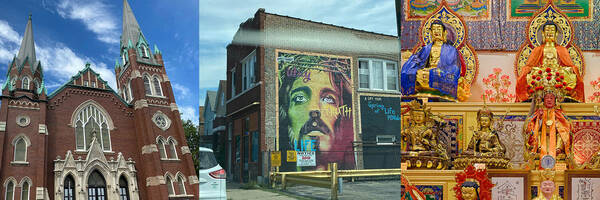
How do neighborhoods where religious congregations are located influence them and how do congregations change their communities? The Chicago Congregations Project (CCP) uses innovative data collection methods so that researchers can address these questions and better understand the role of congregations in urban life.
Using Geographic Information System (GIS) technologies, the CCP is virtually and physically canvassing Chicago’s 77 Community Areas (CCAs) to generate the universe of religious congregations within the city. Based on information from Google Street View, walking and driving streets, and other methods, researchers are also verifying the active status of congregations. When the first phase is completed (end of 2022), the CCP will constitute an unprecedented list of congregations in communities across Chicago.
In the spring and summer of 2023, the CCP will survey religious leaders from all congregations in a sample of 50 CCAs. Questions will focus on membership demographics, religious practices and programs, civic and social activities, among others. The second phase of the CCP will produce the first-ever representative survey of congregations in Chicago communities. The CCP is talking with religious leaders from different traditions throughout the city to gain critical insight for the survey questionnaire. Results will be shared with faith communities as well as disseminated through scholarly publications, news outlets, and social media.
Kraig Beyerlein (Associate Professor of Sociology and Director of the Center for the Study of Religion and Society at the University of Notre Dame) and Ricardo Martínez-Schuldt (Assistant Professor of Sociology at Rutgers University and Faculty Affiliate of the Center for the Study of Religion and Society at the University of Notre Dame) are Co-Principal Investigators of the CCP. Matthew Sisk (Associate Professor of Practice in the Lucy Family Institute for Data and Society at the University of Notre Dame), Brie Loskota (Executive Director of the Martin Marty Center at the University of Chicago Divinity School) and Michael Emerson (Professor of Sociology at University of Illinois Chicago) are Co-Investigators. Peter Ryan (University of Notre Dame) is the project manager. Various undergraduate students from the University of Notre Dame and Chicago-area colleges and universities as well as graduate students from the University of Notre Dame, University of Chicago, and University of Illinois at Chicago are working as research assistants for the CCP.
The CCP is funded by University of Notre Dame Office of the Vice President Faculty Research Support Program, University of the Notre Dame Institute for the Scholarship in the Liberal Arts Large Social Science, and Louisville Institute grants. Along with the Center for the Study of Religion and Society at the University of Notre Dame, the Martin Marty Center at the University of Chicago Divinity School is a key institutional partner for the CCP.